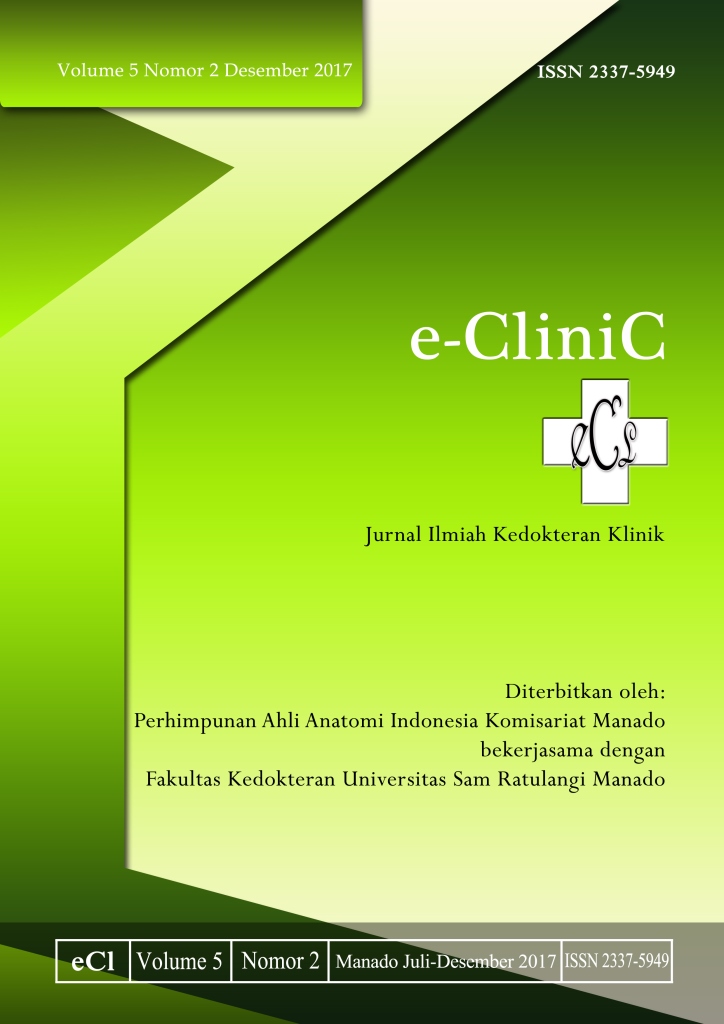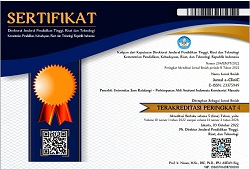Analisis Faktor Risiko Glomerulonefritis Akut Pasca Streptokokus pada Anak Di RSUP Prof. Dr. R. D. Kandou Manado
DOI:
https://doi.org/10.35790/ecl.v5i2.18508Abstract
Abstract: Acute post-streptococcal glomerulonephritis (APSGN) is a part of acute nephritic syndrome characterized by gross hematuria, edema, hypertension, and renal insufficiency. This APSGN is common in children, caused by infection of Streptococcus β-hemoliticus group A nephritogenic strain, and 97% of cases were in developing countries including Indonesia. This study was aimed to obtain the risk factors of APSGN and their association with APSGN. This was a retrospective descriptive study with a cross sectional design. Samples were medical record data of Prof. Dr. R. D. Kandou Hospital Manado during the period of January 2013-October 2017. There were 67 samples in this study consisted of 48 (71.6%) cases of APSGN and 19 (25.3%) cases without APSGN. The bivariate analysis found five variables related to APSGN incidence, as followed: male gender (P =0.005), age ≥5 years (P=0.000), low socioeconomic status (P=0.000), good nutrition (P =0.000), and rainy season (P=0.005). Parents’ education was not related to APSGN incidence. Conclusion: The risk factors of APSGN in children were male gender, age ≥5 years, low socioeconomic status, good nutritional status, and rainy season.
Keywords: APSGN, risk factors, children
Abstrak: Glomerulonefritis akut pasca streptokokus (GNAPS) adalah bagian dari sindrom nefrotik akut (SNA) yang ditandai dengan gross hematuria, edema, hipertensi, dan insufisiensi ginjal. Gangguan ini sering terjadi pada anak-anak, disebabkan oleh infeksi kuman Streptococcus β-hemolyticus group A strain nephritogenic, dan 97% kasus terjadi di negara berkembang termasuk Indonesia. Penelitian ini bertujuan untuk mengetahui faktor risiko GNAPS dan hubungan faktor risiko tersebut dengan kejadin GNAPS. Jenis peneltiian ialah deskriptif retrospektif dengan desain potong lintang. Pengambilan sampel menggunakan data rekam medik RSUP Prof. R. D. Kandou Manado periode Januari 2013-Oktober 2017. Terdapat 67 sampel terdiri dari 48 (71,6%) kasus GNAPS dan 19 (25,3%) kasus yang tidak mengalami GNAPS. Berdasarkan analisis bivariat di temukan 5 varibel yang berhubungan dengan kejadian GNAPS yaitu jenis kelamin laki-laki P=0,005), usia ≥5 tahun (P=0,000), status sosial ekonomi rendah (P=0,000), gizi baik (P=0,000), dan musim hujan (P=0,005). Faktor risiko yang tidak berhubungan dengan kejadian GNAPS ialah pendidikan orang tua (P=0,20). Simpulan: Faktor risiko GNAPS pada anak ialah jenis kelamin laki-laki, usia ≥5 tahun, status sosial ekonomi rendah, status gizi, dan musim hujan.
Kata Kunci: GNAPS, faktor risiko, anak
Downloads
How to Cite
Issue
Section
License
COPYRIGHT
Authors who publish with this journal agree to the following terms:
Authors hold their copyright and grant this journal the privilege of first publication, with the work simultaneously licensed under a Creative Commons Attribution License that permits others to impart the work with an acknowledgment of the work's origin and initial publication by this journal.
Authors can enter into separate or additional contractual arrangements for the non-exclusive distribution of the journal's published version of the work (for example, post it to an institutional repository or publish it in a book), with an acknowledgment of its underlying publication in this journal.
Authors are permitted and encouraged to post their work online (for example, in institutional repositories or on their website) as it can lead to productive exchanges, as well as earlier and greater citation of the published work (See The Effect of Open Access).







